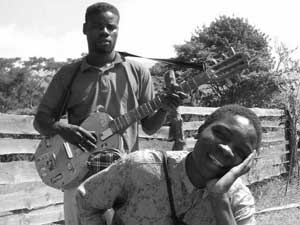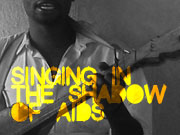 |
| Bunaya Mbewe and his bandmate Frederick hand carve their guitars, and use bicycle brake wire for strings. (Photo: Jonah Eller-Isaacs) |
Rumphi, Malawi — Malawi is a nation in southeast Africa that consistently ranks as one of the world's five poorest. The HIV/AIDS pandemic darkens this countryside of mango, bluegum and acacia trees. You see the impact of the virus everywhere, from the thousands of orphaned children, to the untended fields of corn withering under the equatorial sun.
Across sub-Saharan Africa, HIV infection rates vary widely, but nearly every country is struggling to contain the virus. The United Nations Program on HIV/AIDS, also known as UNAIDS, estimates Malawi's HIV infection rate at just above 14 percent, but local estimates climb as high as 25 or even 30 percent.
As HIV begins to tear at the fabric holding together this nation of red earth and green tobacco leaves, a single death can be devastating.
"My first-born brother passed away in 1998," says Pearson Chirambo. "The diagnosis of AIDS was rather slim in Africa, or in Malawi in particular, and in particular in Rumphi."
Chirambo works with a children's home called Future Vision. It's located in Rumphi, a small town overlooking the burnt umber hills of the southern Rift Valley. Chirambo helps place the children with local families to help them avoid the stigmatization that comes with being an AIDS orphan.
But Future Vision isn't the only community he services. Along with his own family, he now cares for the nine children of his late brother.
"He left nine children. I have to take care of all those children." Chirambo asks, "Can I feed the nine children of my brother, including my own five, my wife and I? The answer is no."
A lucky few have made it out of Rumphi and gone on to university, but many who leave their villages to study return, infected with HIV. Trying to get ahead of this trend, Future Vision volunteers have formed an outreach group to educate the community. Their most effective tool? Music.
MEETING THE CHALLENGES OF HIV
HIV, or the Human Immunodeficiency Virus, weakens the immune system and can develop into AIDS, Acquired Immune Deficiency Syndrome. When HIV begins to attack the immune system, the body has difficulty fighting off infections, so other diseases like malaria or tuberculosis become much more deadly.
Health workers throughout sub-Saharan Africa struggle to provide their patients with even basic services; and HIV, known in Malawi as Edzi, makes their job that much harder. Health professionals like Dr. Trywell Nyirongo have responded with one of the few tools available.
"When we started family planning, which was a very difficult topic to be handled by the people in the country, we went on by singing songs about the advantages of family planning," explains Dr. Nyirongo. "When we sang ... those songs ... it has carried the message to the people, and that this family planning or child spacing has proved to be a success nationwide."
Dr. Nyirongo lives in the village of Nchenachena, and manages a group of clinics in an area of rural Malawi known as "the dead North" because of its lack of economic development and infrastructure.
"Music is more receptive to the people, because once they sing it, the children will take it up and sing it in their homes and in their villages," says Dr. Nyirongo. "And it brings out the meaning of what they're trying to achieve. So music has become a very important tool for understanding a lot of cultural or social problems within the people or within the community."
Music has been an important tool for the Tumbuka people of northern Malawi for centuries. Traditional healers diagnose their patients through dancing and drumming, beating out a rhythm known as vimbuza.
Considering music's deeply embedded cultural role in Malawi and in much of sub-Saharan Africa, it seems only natural that music is used today to educate and promote healthy lifestyles, whether through the voices of a choir or the twang of homemade guitars with strings made from bicycle brake wire.
MUSIC IN THE SCHOOLS
Many schools around Nchenachena have HIV Clubs -- after-school groups that discuss the realities of HIV and AIDS. At their meetings, the students write songs like Tikulire, or "We Are Crying."
One verse says: "My mother has died of the disease. My father has died of the disease. I'm just alone crying. What am I going to do?"
Kwabwera Edzi nthenda yoopsa/nthenda yopanda mankhwala iyi
There is AIDS, a killer disease/the disease that has no cure
Tayendayenda maiko oase/osawapeza mankhwala a Edzi
I searched the whole world for the drug/but I cannot find any cure for AIDS
Tikulira oh ndi nthenda iyi/Usalire oh mphavu zinaliko
We are crying because of the disease/Don't cry, we can fight the disease
Apita mai ndi nthenda iyi/apita bambo ndi nthenda iyi
My mother has died of the disease/my dad has died of the disease
Ndasala ndekha ndikulira ndizatani makolo apita
I'm just alone crying, and what am I going to do? My parents have gone
Ndaphunzira oh za nthenda iyi/Ndaphunzira oh kupewa Edzi
I have learned of this disease/I have learned to prevent AIDS
It's easy for local choirs to take advantage of the Malawian love of music to deliver their message. But local groups may not be in sync with government health initiatives.
Malawi has a federal policy of abstinence-only education. Teachers like LB Msiska support the message.
"With the condoms, we don't encourage that, because we are saying if we teach them about condoms, they will really need to practice that," says Msiska. "But what we say is abstinence. That is the message we are carrying as the perfect method, and not condoms."
By the end of high school, students in the village of Nchenachena haven't officially learned about safe sex. Yet one study recently claimed that Malawian youth were sexually active as early as 11 years old.
Some children have taken it upon themselves to educate each other. During a soccer game, they circle the field dancing and chanting, "HIV, I always use a condom."
Their pro-condom message flies in the face of their abstinence education. And since their aim is to reach the widest audience, they take their message to one of the community's most popular events.
THE HEALING POWER OF MUSIC
Music in Malawi is used to educate, but it's just as crucial as a healing tool. Students from the Lura Secondary School have formed a group called the Paulendo Gospel Singers. Priska Msiska directs the group.
"We would like to spread this message of AIDS through music," says Msiska. "Many people in our area like music, so we think it's very important for us to use music as a gateway to teach these people about the dangers of HIV/AIDS."
The words of their song, "We Will Win Through Prayer," aren't about HIV or AIDS. They're about having a friend in difficult times, and the tune comes from the Presbyterian hymnal. Nineteenth century Scottish missionaries founded churches all over Malawi, following the footsteps of explorer David Livingstone. Their hymns are central now to the country's musical landscape. But hymns are only one part of the tapestry of sound here.
It's a troublesome reality in this Rift Valley village that death is all too common. Tonight, family and friends have gathered to mourn the passing of Alec Nyirongo. Nyirongo was one of the village chiefs, and his death leaves several children without a father and his neighborhood without leadership.
Nyirongo succumbed to tuberculosis, and was more than likely HIV positive. Five days ago, villagers took his bougainvillea-strewn coffin to the graveyard, and have since been in public mourning.
Tonight is the final night of cleansing and remembrance in the home of Nyirongo's widow. Mourners fill every inch of the dusty concrete floors, and the house smells of sweat and burning wax. Local bands, exhausted after five days of performance, lean with their drums and bells against the paint-chipped walls. Music saturates the cramped space. Their singing continues past dawn.
Even surrounded by death, the residents of Nchenachena turn to music to heal, to comfort, and move on.












